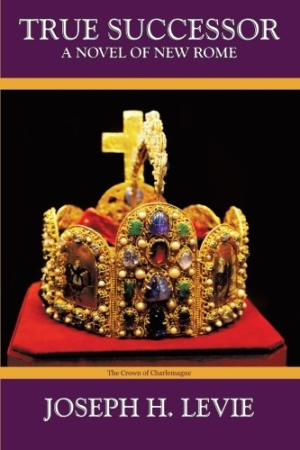True Successor
A Novel of New Rome
This fast-paced, tension-filled revisionist historical novel envisions an alternate Holy Roman Empire.
Joseph H. Levie has rewritten the known aftermath of the downfall of Charlemagne’s Holy Roman Empire. In his thrilling debut novel of political and personal intrigue affecting the fate of nations and the lives of his characters, he answers his own question, “What would have happened if the Roman Empire had not collapsed?”
Levie’s superior tale of revisionist history will appeal to readers of all ages regardless of what they know about the historical facts he has massaged to make his novel believable and readable. Using the names of well-known icons such as Charlemagne, Haydn, Mozart, and Beethoven, and of sites such as Rome and Vienna to anchor his story in reality, Levie offers a riveting account of a young political officer, Mikail de Reuter, as he eludes invading Mongols, protects the emperor of New Rome against spies and traitors, foils the assassination of key members of the royal family, and finds true love—all at an exciting, page-turning pace.
Levie’s introductory note, just a bit longer than a page and titled “A Word With The Reader,” summarizes the true historical highlights of his story. With this as background, he launches into his gut-grabbing prologue, which describes the assassination of a potential “true tuccessor to Charlemagne” by the would-be successor’s own family members. The twenty-one well-written, well-edited chapters that follow sustain the high-pitched drama of the prologue as the narrative races toward an equally tension-filled assassination attempt involving the same members of the original group, now turning on one of their own.
As well done as Levie’s engaging plot line of politics, diplomacy, bribery, warfare, and assassination is, his development of his characters is even better. De Reuter, who begins as a naive young lover accidentally caught up in a Mongol plan backed by Byzantines to invade his homeland, matures into a loyal aide to the emperor. He discovers the identity of “Sharpie,” the Emperor’s would-be killer, and stops a bullet intended for the king.
The monarch, who objects to the empress calling him “Sweetie,” is the master diplomat counseling his brother: “In the meanwhile, Aetius, you really ought to learn how to manipulate people. It’s part of the job.” He is the same emperor and the true successor to Charlemagne, who, after Mikail is wounded and the failed assassins have been killed in a bloodbath, soulfully asks the question, “What have I done, and who has cursed me, that I must kill those I love to keep the world together?” In turn, these two are well-supported by aristocrats, commoners, friends, and foes in the courts, ballrooms, shops, streets, and even a fictional parliament. The full-color cover-art photograph of the actual crown of Charlemagne also adds authenticity to the story.
Despite the number of typographical errors and the confusion caused by references to Mikail de Reuter as Mikail Reuter or Mikail de Ruyter, Levie’s novel of a fictionalized New Rome is definitely recommended.
Reviewed by
Wayne Cunningham
Disclosure: This article is not an endorsement, but a review. The publisher of this book provided free copies of the book and paid a small fee to have their book reviewed by a professional reviewer. Foreword Reviews and Clarion Reviews make no guarantee that the publisher will receive a positive review. Foreword Magazine, Inc. is disclosing this in accordance with the Federal Trade Commission’s 16 CFR, Part 255.

